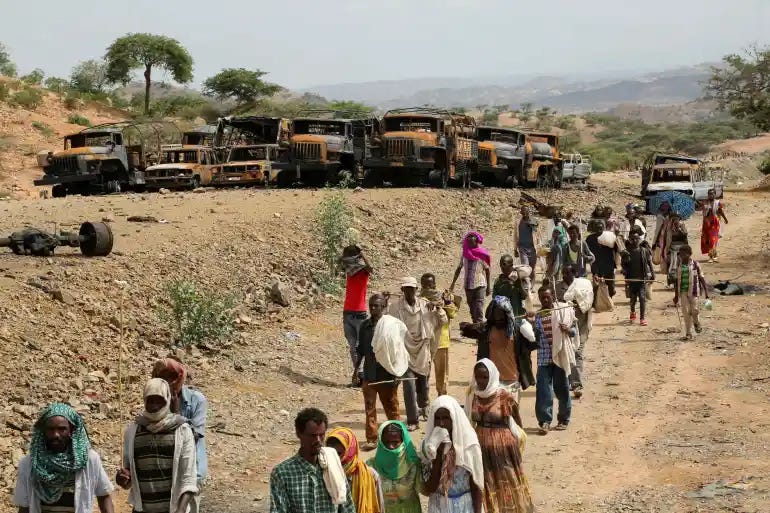New calls to send U.S. troops into Ethiopia
Guest post: The idea that U.S. troops can solve Ethiopia's “Civil War" is preposterous and without any logic.

More than 12 months of fighting between Ethiopian federal troops and TPLF forces have caused a humanitarian disaster costing thousands of lives and displaced more than two million people, with 400,000 people at risk of starvation in what was one of the region’s fastest-growing economies.
Covid cases are on the rise as war displaces populations, destroys health system infrastructure, interrupts health service delivery, and diverts the attention of political leadership.
The growing threat of escalation and expansion of the fighting threatens to de-stabilize the entire Horn of Africa and invite western military intervention. There are new calls coming from foreign policy think-tankers to send in U.S. troops and Sec. of State and cold-war cheerleader, Anthony Blinken is already in neighboring Kenya to see if there’s any advantage to be had vis-a-vis China, in a U.S. direct intervention. Ethiopia has become a hub for China’s Belt and Road Initiative in Africa which is threatened by the growing ethnic conflict.
The U.S. currently has about 7,000 troops in Africa and a permanent military base at Camp Lemonnier in neighboring Djibouti. General William Zana, commander of U.S. military operations in the Horn of Africa, told the BBC that US troops were "here to respond to crisis".
"It's a big concern to us and strategic partners. We might be forced to respond militarily or even force a political settlement.”
Because the situation is so grave and so complex and with so little reliable information about Ethiopia available in the U.S. media, I asked Fassil Dimissie, associate Professor of Public Policy Studies at DePaul University, to contribute his thoughts about a possible U.S. military intervention in the region.
The arrogance of power
by Fassil Dimissie
New pundits of old and discredited ideas in the aftermath of the Afghanistan disaster are peddling the notion that the U.S. should send troops to sort out the 'civil war' in Ethiopia. We have heard this before as a "nation-building" project, or ‘war against terrorism’ from one end of the world to the other. Countless lives and billions of taxpayers' money have been lost and untold suffering has visited so many people.
It’s neither rational nor just for the U.S. military to be a bystander to a coup at home while trying to intervene in a country most Americans do even know. Truly tragic. No lessons learned from past U.S. policy failures in Libya, Somalia, Syria, Iraq, and Afghanistan.
The idea that U.S. troops can solve Ethiopia's “Civil War" is preposterous and without any logic, and could only come from idiots who have no understanding of the complex demographic and religious make-up of Ethiopia, its forbidding geography, or the country's long and illustrious history. Under whose auspices are they going to send troops into Ethiopia? The United Nations or the African Union? No, clearly, this is going to be a unilateral project without any UN or AU support.
The primary objective of the U.S. now is not really to “solve” the alleged "civil war" but to pursue its own perceived interests, to save its project to balkanize the country along ethnic lines and reimpose ethnic apartheid in Ethiopia. Past administrations have helped finance this plan as the new mode of governance structure the West has been pushing relentlessly for almost thirty years.
Ethiopia under the Tigre Peoples Liberation Front (TPLF) -- a front that claims to represent ethnic Tigreans (who represent six percent of Ethiopia's 118 million population), is their Trojan horse. With massive Western backing particularly the U.S. and the U.K., the once leftist front came to power in the aftermath of the downfall of the military government and began to impose ethnic apartheid to control the state structures, military and security apparatuses, banking, trade, and communication.
A reign of terror and an Orwellian system was imposed to stifle dissent, freedom of the press, and freedom of mobility. To ensure this model of the totalitarian system a new national identification system much like that in apartheid South Africa was introduced to buttress the ethnic division of the country which the TPLF carefully drew as the new geography of Ethiopia while the Western governments and media kept silent.
The system that was imposed by TPLF ended in 2018. Now the US/UK and more generally Western governments are desperately seeking to restore it given their regional strategic interest in the Horn of Africa vis-a-vis China and Russia.
Bringing an end to this conflict will necessitate bold and creative solutions bringing key players to a negotiation process. The Biden Administration’s misguided one-sided support for the TPLF along with the imposition of sanctions on Ethiopia and Eritrea has been a failure. Indeed, this failure reflects a much wider challenge for the Biden Administration to develop a bold and clear Africa policy, something that’s been neglected so far in his administration.
Removing the current U.S.-imposed sanctions on Ethiopia and Eritrea along with TPLF military withdrawal from Amhara and Afar territories, as well as lifting the humanitarian embargo by the Ethiopian government on Tigre must be part of the first-stage of a broader strategy to bring the warring parties together to the table for dialogue along with other regional and African partners.
Fassil Demissie is the editor of Ethiopians in an Age of Migration: Scattered lives beyond borders. He’s also co-editor of the journal African and Black Diaspora and a member of the Editorial Boards of African Identities: A Journal of Economics, Culture, and Society.
SUBSCRIBE
If you like my newsletter and would like to receive it each in your mailbox, hit the SUBSCRIBE button and join the Edu/Pol community either as a free or paid subscriber. Your paid sub costs $7/month and will help keep Edu/Pol going. Thanks in advance. —M.K.
